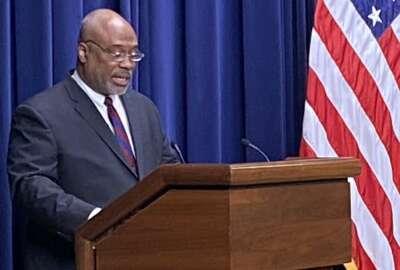

Some solid career people are keeping the lights on at the Office of Federal Procurement Policy. But the Biden administration has so far given few signals about what...
Best listening experience is on Chrome, Firefox or Safari. Subscribe to Federal Drive’s daily audio interviews on Apple Podcasts or PodcastOne.
Some solid career people are keeping the lights on at the Office of Federal Procurement Policy. But the Biden administration has so far given few signals about what it plans to do with federal procurement. For what we might expect to see, Federal Drive with Tom Temin turned to former OFPP administrator, now a partner at the law firm Akin Gump, Angela Styles.
Interview transcript:
Tom Temin: Ms. Styles, good to have you back.
Angela Styles: Thank you for having me.
Tom Temin: So we have not seen signals. And I guess maybe it’s too early in the administration. But usually they do signal what they want to do with procurement, just because it’s a $500 billion tab for the government every year.
Angela Styles: Well, I think if you look at some of the executive orders, you’re going to see a pretty significant reliance on the [Federal Acquisition Regulatory] Council for issues like [the] “Buy American” executive order and climate change, dealing with electric vehicles. And so there have been some signals about the procurement system and their reliance on it for implementation of some of their significant issues that they’re issuing through executive order.
Tom Temin: Because the Buy American one in particular, has to overlay with new adopted rules that were launched during the Trump administration, but became finalized, I think, just a few days after the inauguration. So there’s a little bit of a clash of cultures there.
Angela Styles: There’s a little bit of a clash of cultures, but in many ways it was headed the same direction. And I think the Biden executive order went even further and put significant reliance on the FAR Council to really take a look at some of the important issues, and they’re gonna have to have somebody at OFPP with their role on the FAR Council to really make sure that those are implemented in a way that, you know, achieves their goals or are made in America.
Tom Temin: Because for the average contracting officer, at some point, it’s going to be difficult to do the sourcing, if the Buy America applies very widely. I mean, we’re talking about the under $182,000 threshold for the Trade Agreements Act, but for the Buy American, I mean, it’s getting harder and harder to find low priced items made in America.
Angela Styles: Well, that’s exactly right. I mean, if they take away the commercial IT exception if they renegotiate our trade agreements, and, you know, take away that threshold or change the products and equipment that it applies to, it could be a significant difference. But it also could spur manufacturing in the United States over you know, a fairly significant period of time.
Tom Temin: Yeah, I was joking to someone recently, we could see the return of the Zenith PC or the Unisys PC that they’ve made here in those days.
Angela Styles: That’s right. You never know what it can bring about.
Tom Temin: Alright, when they do find someone for OFPP, what should they do first, that person?
Angela Styles: Well, I think being involved in the Office of Management and Budget, and the White House at a political level is just critically important to OFPP functioning properly. In the last administration in the Trump administration, you really didn’t have somebody that was actively engaged to the political level. And so you had GSA really take over the procurement role and dominate even I think over DoD in many instances. And so you really need OFPP as a player in that, along with GSA and along with DoD in order to really effectuate changes that may be needed in the procurement system.
Tom Temin: Yeah, Michael Wooten did some good things toward the end when he finally got up to speed, but he didn’t get there very early in the administration. And that probably made it hard to get stuff done. Because these initiatives often take a year or more.
Angela Styles: I think that’s exactly right. And although it does take a little while – I wasn’t chosen until March – most OFPP administrators are not even confirmed until June. So I’m not sure that they’re per se behind the curve, you can certainly get into the swing of things if you’re over there by March or April, and you’re involved in the activities that are going on at a political level and are engaged then.
Tom Temin: We’re speaking with Angela Styles, a partner at Akin Gump and former administrator of the Office of Federal Procurement Policy under the George W. Bush administration. And there’s been some questions raised recently about the need to get some modernization, I guess you could call it, for the suspension and debarment process, which can be kind of disjointed, used a lot, in some cases never used in some other agencies. What’s your feeling about what’s going on there?
Angela Styles: Well, I think you’re gonna see increased enforcement generally, which makes it ever more important that there be modernization in the suspension and debarment process because you can’t have somebody treated one way at one agency and treated a different way and another agency. And it’s also, it shouldn’t be the case that you have to hire a lawyer to understand what the process is. It should be transparent and clear and equal at all the different agencies both in terms of how the process works, as well as enforcement.
Tom Temin: I guess you could extend that also to appeal, too, for the contractors that feel they might have been wrongly debarred or suspended?
Angela Styles: That’s right, although appeal, you know – the problem is there’s not a really good appeal process other than going to federal court at this point. That’s your only choice. And it’s an expensive process. And if you’re an individual or a small business, it’s almost impossible for you to do.
Tom Temin: So what should the elements of a modernized or updated process include?
Angela Styles: Well, I think very consistent rules across agencies, I think better training for some of the agencies that don’t actually use it. And, you know, that’s just a start. I think that making sure people have a real opportunity to have a hearing and be heard and to know what the issues are, you know, really a thoughtful process before somebody is suspended without a hearing – issues like that.
Tom Temin: And sounds like some training of the workforce, then, the 1102’s and people surrounding them, perhaps?
Angela Styles: I think to know what the suspension and debarment process is about, to potentially be more involved in it, because right now, none of the contracting people are involved in the suspension and debarment process. It’s completely separated for a reason, you know, to be independent, but I think you need to hear from a contracting officer, to know how the experience has been with a particular contractor.
Tom Temin: And would this eventually, if there is some kind of a redo that’s fairly comprehensive, would that be required to move up to the FAR Council level and get incorporated into the FAR?
Angela Styles: I think it should be. I mean, one thing you have to realize is the FAR Council doesn’t have control over the grants. And so you have to have an equal process for contracts and grants. And so, you know, it should go through the FAR Council, but you should have also the Office of Federal Financial Management at OMB. Involves – the process is the same whether it’s grants or contracts.
Tom Temin: And perhaps some of the data sharing that’s happening through the still burgeoning GSA development systems, they’re still getting SAM[.gov], you know, up to its final form. It might be easier to understand what’s going on with contractors at some point, if you can see the data.
Angela Styles: I think that’s right, particularly if it’s a performance issue. So you do see the suspension and debarment process used for performance issues where contractors have been terminated for performance. And that data I think, is particularly important, if you want to use it for more than, you know, fraud or bribes or things like that.
Tom Temin: Angela Styles as a partner at Akin Gump and former administrator of the Office of Federal Procurement Policy. As always, thanks so much.
Angela Styles: Thank you very much. I appreciate it.
Tom Temin: We’ll post this interview at FederalNewsNetwork.com/FederalDrive. Subscribe to the Federal Drive at Podcastone or wherever you get your shows.
Copyright © 2025 Federal News Network. All rights reserved. This website is not intended for users located within the European Economic Area.
Tom Temin is host of the Federal Drive and has been providing insight on federal technology and management issues for more than 30 years.
Follow @tteminWFED



